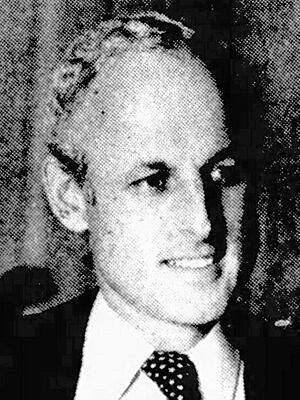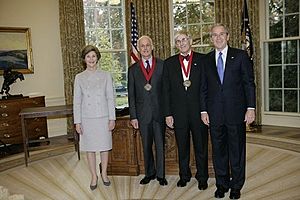Lewis Lehrman facts for kids
Quick facts for kids
Lewis Lehrman
|
|
|---|---|

Lehrman in 1982
|
|
| Born | August 15, 1938 (age 87) Harrisburg, Pennsylvania, U.S.
|
| Alma mater | Yale University (BA) Harvard University (MA) |
| Political party | Republican |
Lewis E. "Lew" Lehrman, born on August 15, 1938, is an American businessman, historian, and former politician. He is known for his work in business and for his deep interest in American history, especially the life of Abraham Lincoln. In 2005, he received the National Humanities Medal, a special award given for important contributions to the humanities.
Mr. Lehrman writes for the Lincoln Institute, an organization focused on Abraham Lincoln. He is also a senior partner at L. E. Lehrman & Co., an investment company he started in 1981. Since 1972, he has been the chairman of the Lehrman Institute, which is a foundation that supports research and projects about public policy. On November 10, 2005, Mr. Lehrman and Richard Gilder were given the National Humanities Medal by U.S. President George W. Bush in the Oval Office.
Contents
Early Life and Schooling
Lewis Lehrman was born in Harrisburg, Pennsylvania, on August 15, 1938. His mother was Rose (Herman) and his father was Benjamin Sachs Lehrman, who was in charge of the Rite-Aid Corporation. His family had a Jewish background.
Mr. Lehrman went to The Hill School, which is a boarding school in Pottstown, Pennsylvania. He started teaching history as a special fellow at Yale University in 1960. Later, he continued his studies at Harvard University, where he earned a master's degree.
His Career Journey
Lewis Lehrman has had a varied career as a writer, businessman, and historian who studies economics. He was also the president of Rite Aid Corporation.
Working at Rite Aid
The Rite Aid Corporation grew from a family business that sold groceries wholesale in central Pennsylvania. This business, Louis Lehrman & Son, was started by Lewis Lehrman's grandfather, Louis, and later expanded by his father, Benjamin. When he was a teenager, Lewis Lehrman worked part-time at the company during holidays. He continued to work there during summers and holidays while he was studying at Yale and Harvard.
In 1962, the company began opening stores that sold health and beauty products in Pennsylvania. These stores were small competitors in towns. Lewis Lehrman joined the company full-time in 1964, the same year the first Rite Aid pharmacy opened in New York State. The New York Times reported that Lehrman had to travel from town to town, looking for older stores in downtown areas where landlords were eager for tenants. Once a location was found, he and his partners would spend a Saturday painting and remodeling the store. On Sunday, they would stock the shelves, and by Monday, the store would be open for business.
Rite Aid became a public company in 1968, meaning its shares could be bought and sold by the public. The company continued to grow. At that time, Lewis Lehrman was the company's president and its largest shareholder, owning 32 percent of the company's stock. Alex Grass, Lehrman's brother-in-law, who was brought into the business by Lehrman's father, eventually became the chief executive.
Lehrman left his role as Rite Aid president in 1977 and as chairman of the company's executive committee in 1981. He eventually ended all his connections with the company. His role in helping to build Rite Aid became a topic of discussion during his 1982 campaign for governor of New York.
After leaving Rite Aid, Lehrman also worked as a managing director at Morgan Stanley, a large financial company, in the late 1980s. In 1991, he started his own investment company, L.E. Lehrman & Co. He was also an investor in George W. Bush's company, Arbusto Energy.
Running for Governor
Lewis Lehrman was the president of Rite Aid until 1977. He left all his positions in 1981 to run for governor of New York the next year. He believed that "elective office is the only way to get things done." He became well-known for wearing red suspenders in his campaign advertisements. On June 16, 1982, he was chosen as the official candidate for governor by the Republican Party. He later won the primary election and became the Republican candidate.
During his campaign, Lehrman wanted to reduce taxes. He often spoke directly to voters about his ideas. He ran on the tickets of both the Republican and Conservative Parties. However, he was defeated by Lieutenant Governor Mario Cuomo, with Cuomo winning 51% of the votes to Lehrman's 48%. Cuomo had won the Democratic primary against New York City Mayor Edward I. Koch. Lehrman won the Republican nomination in a primary against attorney Paul J. Curran.
Experts noted that Lehrman won most of the upstate counties in New York, while Cuomo won New York City. The debates between Lehrman and Cuomo were described as lively and focused on important issues like the state's economy and crime.
Lehrman's campaign was affected by high unemployment rates across the country and in New York State. His campaign spent a lot of money on advertising, especially on television. His ads were shown so often that a magazine even made a cartoon about it. Cuomo also spent a lot on his campaign, though he complained about Lehrman's high spending. Cuomo won the election and served three terms as governor.
History and Education Work
In the 1970s, Lewis Lehrman went back to Yale University to help review the history and literature courses for the Yale University Council. He and Richard Gilder started collecting historical documents to create the Gilder Lehrman Collection. This collection would be available for scholars and the public to study. The collection is now kept at the New-York Historical Society. By 2006, it had over 60,000 documents and other historical items, mostly from the 18th and 19th centuries in America. These items have been used in exhibits at places like George Washington's Mount Vernon and the Morgan Library. Lehrman himself has written and given talks about Abraham Lincoln's importance in American history.
In 1972, Lehrman founded the Lehrman Institute, a research group in New York City that studied economic and foreign policy from a historical point of view. In 1994, Lehrman and Richard Gilder, who were friends from Yale University, also founded the Gilder Lehrman Institute of American History and the Gilder Lehrman Collection of historical documents. Lehrman said that the goal of building the collection was to get important documents out of private hands and into a place where they could help American students and teachers.
They also helped create the Lincoln and Soldiers Institute at Gettysburg College. This institute gives out the Lincoln Prize every year for the best scholarly work about Abraham Lincoln, the American Civil War soldiers, or topics from that time. They also founded the Gilder Lehrman Center for the Study of Slavery, Resistance and Abolition at Yale University, which awards the Frederick Douglass Prize for the best work in those areas.
Lehrman believes that studying American history is very important. He noted that many schools have reduced history classes. He said that he and Gilder wanted history to be something everyone could learn about. They created prizes to encourage scholars and teachers to study and write about American history. The first Lincoln Prize was given to filmmaker Ken Burns for his Civil War series on PBS.
In 2013, Lehrman published The American Founders, a book of essays about the leaders of the Revolutionary War. In 2017 and 2018, he published Churchill, Roosevelt & Company: Studies in Character and Statecraft and Lincoln & Churchill: Statesmen at War. These books look at how leaders like Abraham Lincoln and Winston Churchill guided their nations during wartime.
The Lincoln Institute
Lehrman started the Lincoln Institute to support scholars and groups who study the life of Abraham Lincoln, the 16th President of the United States. The institute helps create and share books, videos, and online resources about Lincoln. It also encourages scholars to work together and share historical materials.
The institute also manages six websites about Abraham Lincoln and the people he knew. In 2013, Lehrman published Lincoln "by littles," which is a collection of his essays about Lincoln and the Civil War.
Supporting Conservative Ideas
Lewis Lehrman is involved in many community and conservative causes. He was a board member of the Project for the New American Century for a year. In the late 1970s, he was a trustee at the American Enterprise Institute and was an early trustee of The Heritage Foundation until the 1990s. He also served as a trustee for the Manhattan Institute and the Pierpont Morgan Library.
In 1983, he helped create Citizens for America, an organization that supported the anti-communist Contra guerrillas in Nicaragua. This idea came from Jaquelin H. Hume, a friend of President Ronald Reagan. Reagan called Lehrman, and they agreed that a national group was needed to focus on economic and national security policies. They wanted to influence public opinion across America.
At one point, Lehrman was considered a possible future Republican candidate for president. Some political writers reported that Ronald Reagan thought about naming him U.S. Secretary of the Treasury. Lehrman also wrote several memos for President-elect Reagan about money and government spending policies.
In 1985, Jack Abramoff briefly ran Citizens for America, but he was later fired for mismanaging funds. That year, Citizens for America organized a meeting in Angola for anti-communist rebels from Angola, Nicaragua, Afghanistan, and Laos. Lehrman personally attended this event, called the Democratic International. Lehrman stepped down from Citizens for America in September 1986.
Supporting the Gold Standard
From early on, Lewis Lehrman became a strong supporter of the gold standard, an idea that a country's money should be directly linked to a certain amount of gold. In 1981, he was a member of the U.S. Gold Commission with Congressman Ron Paul. In 1982, they co-wrote a book called The Case for Gold. Lehrman has written many articles for newspapers and magazines about his views on money. He also contributed to Money and the Coming World Order and wrote The True Gold Standard (2012). He has testified before government committees, arguing for a return to the gold standard.
In 2011, Lehrman launched "The Gold Standard Now," a website that shares news about money policies and argues that "America should lead by unilaterally resuming the gold standard." In 2013, he published Money, Gold and History, a collection of his writings on money policy and his support for the gold standard.
Lehrman has often argued that paper money, which is not backed by gold, can harm working Americans. He believes that the gold standard protects the value of wages and salaries for people who cannot defend themselves in government or financial centers.
Lehrman American Studies Center
In 2005, with funding from Lewis Lehrman, the Intercollegiate Studies Institute created the Lehrman American Studies Center. This center aimed to improve higher education by creating good conditions for discussions and studies, especially in American Studies. The center offered various programs, including a two-week summer institute at Princeton University for young academics. It also had an online library of teaching materials. Lehrman noted that he learned at Yale how much students can gain from working closely with historians, and he tried to create similar learning environments in his own institutes.
 | Lonnie Johnson |
 | Granville Woods |
 | Lewis Howard Latimer |
 | James West |


